PHNOM PENH, Cambodia – After years of collaboration on several capacity-building initiatives for teachers and school garden coordinators in Cambodia, the Southeast Asian Regional Center for Graduate Study and Research in Agriculture (SEARCA) and the Center of Excellence on Sustainable Agricultural Intensification and Nutrition (CE SAIN) officially inaugurated its agreement for the project titled "Participatory Action Research on Integrating the School-plus-Home Gardens cum Biodiversity Enhancement and Enterprise for the Improvement of Agricultural Technology Parks (ATPs) and Mini-ATPs in Cambodia (SHGBEE Cambodia)" that was held via Zoom on 16 May 2024.
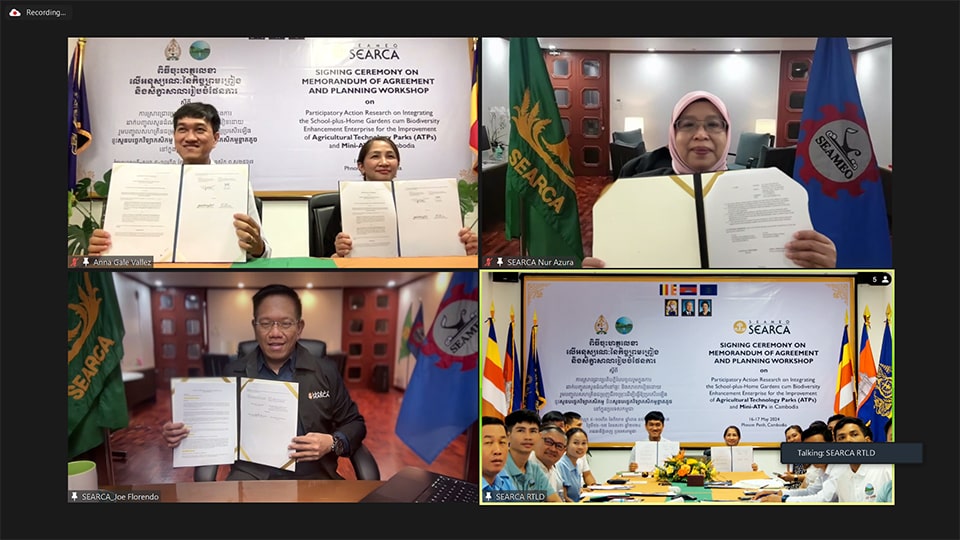 Dr. Lyda Hok (upper left), center director of the Center of Excellence on Sustainable Agricultural Intensification and Nutrition (CE SAIN) together with SEARCA representatives composed of Dr. Gerlie Tatlonghari, Dr. Nur Azura Binti Adam, and Assoc. Prof. Joselito Florendo, showed the signed Memorandum of Agreement (MOA).
Dr. Lyda Hok (upper left), center director of the Center of Excellence on Sustainable Agricultural Intensification and Nutrition (CE SAIN) together with SEARCA representatives composed of Dr. Gerlie Tatlonghari, Dr. Nur Azura Binti Adam, and Assoc. Prof. Joselito Florendo, showed the signed Memorandum of Agreement (MOA).
During the ceremonial signing of the Memorandum of Agreement (MOA), Dr. Nur Azura Binti Adam, SEARCA's deputy director for programs, represented Dr. Glenn Gregorio, SEARCA center director. In her message, Dr. Nur emphasized that "To go beyond what we can offer, we need partnership to help more communities. And to contribute to their welfare, we need to share what we have and what we know." On the other hand, Dr. Lyda Hok, center director of CE SAIN, expressed his commitment and reinforced the collective responsibility among CE SAIN, SEARCA, and other key partners to work together toward the success of SHGBEE Cambodia.
 The project management team of SHGBEE Cambodia led by Dr. Lyda Hok (left photo) and Dr. Leangsrun Chea of CE SAIN (middle photo) together with Dr. Gerlie Tatlonghari, Ms. Anna Gale Vallez, and Ms. Rochella Lapitan (right photo; 4th from left to right) of SEARCA organized the project’s organizational meeting and planning workshop. (Photos by CE SAIN)
The project management team of SHGBEE Cambodia led by Dr. Lyda Hok (left photo) and Dr. Leangsrun Chea of CE SAIN (middle photo) together with Dr. Gerlie Tatlonghari, Ms. Anna Gale Vallez, and Ms. Rochella Lapitan (right photo; 4th from left to right) of SEARCA organized the project’s organizational meeting and planning workshop. (Photos by CE SAIN)
The event was likewise witnessed and attended by Dr. Leangsrun Chea, agricultural technical manager of CE SAIN and Assoc. Prof. Joselito Florendo, deputy director for administration of SEARCA. SEARCA was also represented by Dr. Gerlie Tatlonghari, program head of the Research and Thought Leadership Department; Ms. Anna Gale Vallez, program specialist; and Ms. Rochella Lapitan, senior program associate.
Setting up the Stage for SHGBEE Cambodia
The ceremonial signing of the MOA of the SHGBEE Cambodia kicked off the project's organizational meeting and planning workshop that was participated in by 21 teachers and school garden coordinators from CE SAIN's pilot schools with mini-ATPs and was held at CE SAIN's Head Office in Phnom Penh, Cambodia from 16–17 May 2024. It served as a platform where SEARCA and CE SAIN laid down the project team's organizational structure and the strategic plans to execute the activities within the project period.
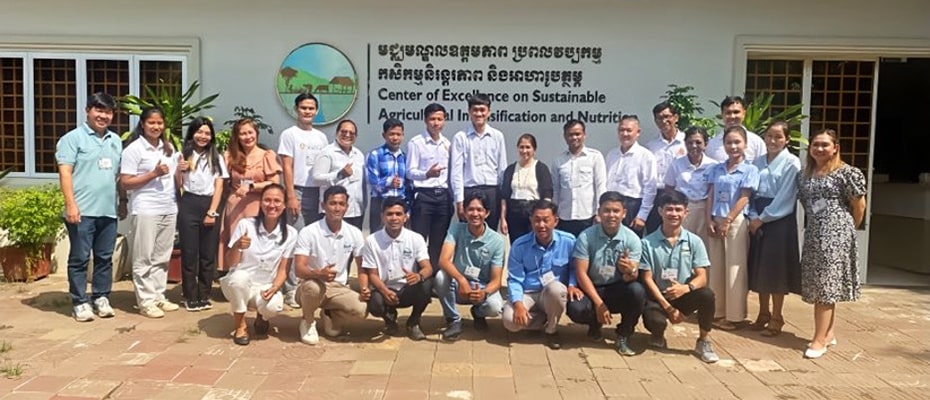 Twenty-one participants from four attached high schools of the CE SAIN with mini-ATPs participate in the SHGBEE Cambodia’s organizational meeting and planning workshop organized by SEARCA.
Twenty-one participants from four attached high schools of the CE SAIN with mini-ATPs participate in the SHGBEE Cambodia’s organizational meeting and planning workshop organized by SEARCA.
The organizational meeting and planning workshop was divided into two workshop sessions. Workshop 1 covered the discussions and group activities for the preproject implementation phase that include the formation and coordination mechanisms of the Project Steering Committee (PSC) and the Technical Working Group (TWG), development of the project's logical framework, institutional arrangements, stakeholders' identification and analysis, and refinement of action plans.
Meanwhile, workshop 2 focused on the project's implementation strategies based on its workplan and monitoring and evaluation mechanisms. This will enable the project team to keep track of its deliverables, which will be essential in achieving its objectives, outcomes, and impacts.
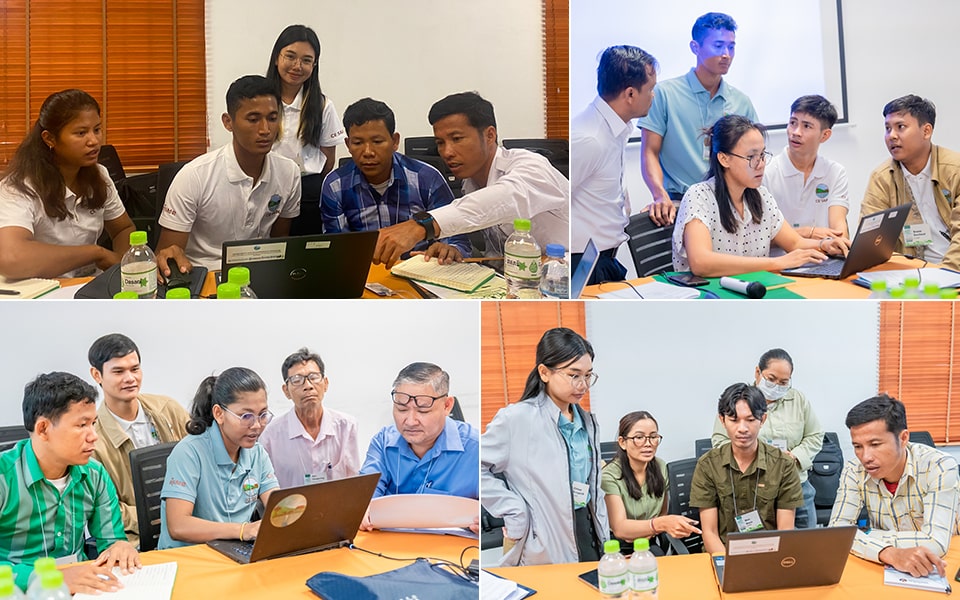 Participants discuss the activities of each project component during the breakout session. (Photos by CE SAIN)
Participants discuss the activities of each project component during the breakout session. (Photos by CE SAIN)
As a culminating activity, the status of the school gardens of pilot schools was pre-evaluated using the proposed standard monitoring and evaluation (M&E) tool following the three-star approach (TSA). This tool will be further enhanced with indicators that are contextualized for Cambodia's setting.
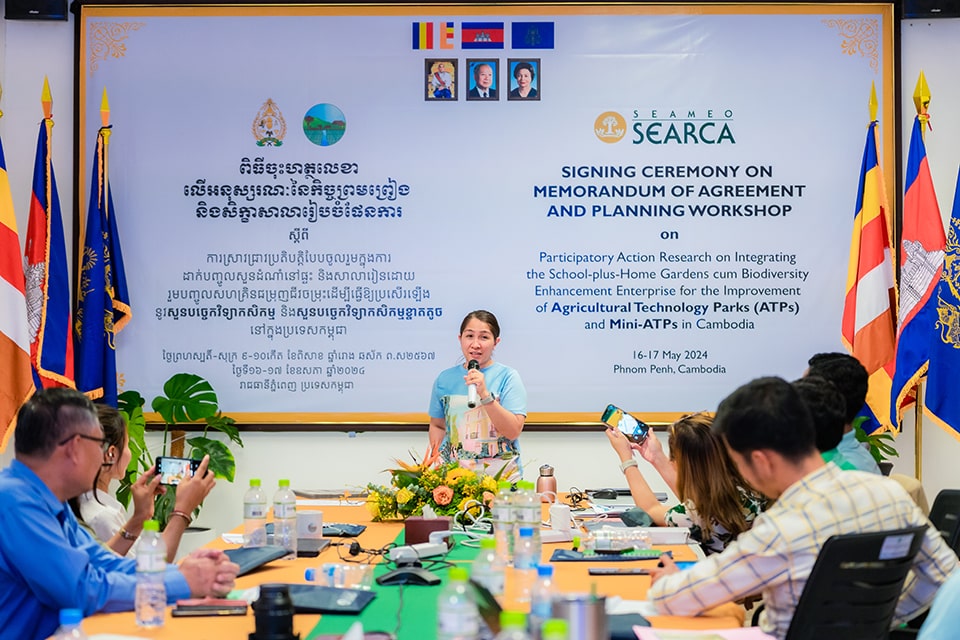 Dr. Gerlie Tatlonghari delivers a closing message to the Cambodian participants. (Photo by CE SAIN)
Dr. Gerlie Tatlonghari delivers a closing message to the Cambodian participants. (Photo by CE SAIN)
During the closing program, Dr. Tatlonghari expressed her gratitude to CE SAIN for its partnership with SEARCA. "I am optimistic that this collaborative project will become a success. Moreso, I am looking forward to more projects with CE SAIN in areas of common interest," she said.
SHGBEE Cambodia: Gearing towards the Improvement of ATPs and Mini-ATPs
SHGBEE Cambodia was inspired by the success of the School-plus-Home Gardens Project (S+HGP) which was well-implemented by SEARCA in the Philippines in 2016. It is one of the two scaled-up sites that replicated the S+HGP model with added components of biodiversity enhancement and enterprise development.
The project aims to improve the nutrition, education, and economic well-being of high school learners and promote agrobiodiversity stewardship, sustainable livelihood, and enterprise development. Moreover, it aims to create an enabling environment for integrating the SHGBEE concepts in the improvement of CE SAIN's ATPs and mini-ATPs through (1) the establishment of school and home gardens; (2) the capacity enhancement of school and community members toward food and nutrition security; (3) fostering institutional partnerships of the schools, households, and local authorities; and (4) recommending strategies and policies to ensure the sustainability of SHGBEE program. It will be implemented in CE SAIN's four pilot schools' mini-ATPs, which include Chea Sim Tbeng Meanchey, Raksmey Sophanna High School, Samdech Euv High School, and the Institute of Community Development.
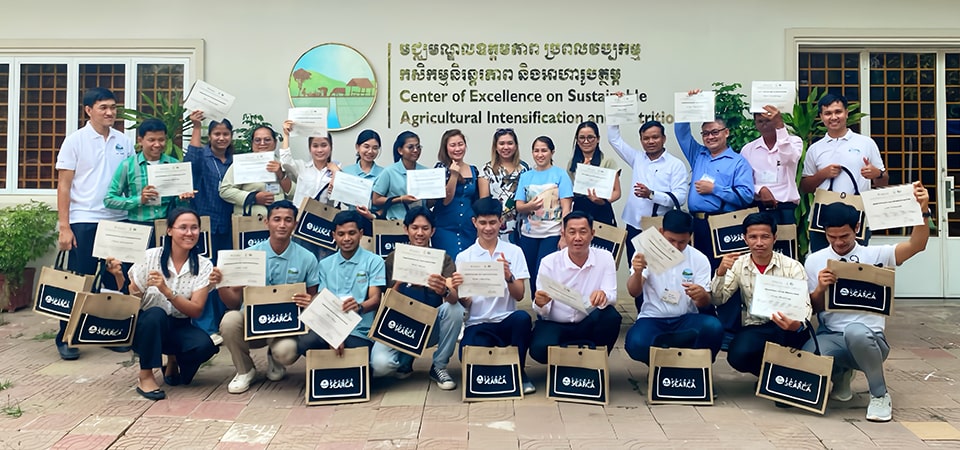 The SHGBEE Cambodia project team successfully finished the two-day organizational meeting and planning workshop
The SHGBEE Cambodia project team successfully finished the two-day organizational meeting and planning workshop
Within two and a half years, SHGBEE Cambodia will carry out its activities through a phased approach implementation. These include baseline and endline assessments of the nutrition and economic well-being of young learners, curriculum integration of SHGBEE concepts, social enterprise and business plan development, school gardens M&E tool standardization, local policy recommendations and development for the program's sustainability, and crafting of a guidebook or operations manual.